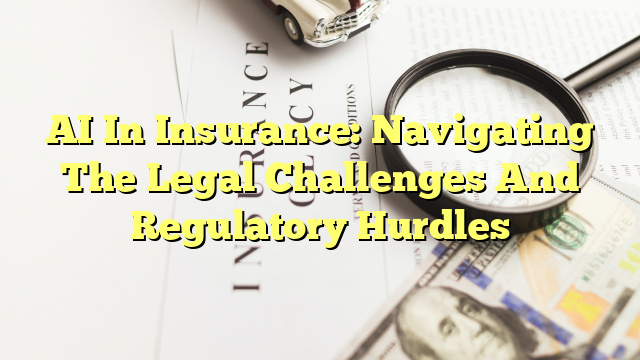Table of Contents
Legal Challenges
Artificial intelligence (AI) presents a range of legal challenges for the insurance industry. One of the main challenges is the issue of liability. As AI systems become more autonomous and make decisions on behalf of insurers, it becomes difficult to determine who is responsible for any errors or harm caused by these systems. Additionally, AI raises concerns about privacy and data protection, as insurers collect and analyze large amounts of personal data to train their AI models.
Another legal challenge is ensuring compliance with existing regulations. As AI technology advances, regulations may need to be updated to address the unique challenges posed by AI in the insurance industry. Insurers must navigate these regulatory hurdles to ensure that their use of AI is in compliance with the law.
Impact on the Insurance Industry
The impact of AI on the insurance industry is significant. AI has the potential to streamline processes, improve efficiency, and enhance customer experience. With AI, insurers can automate underwriting and claims processing, reducing the time and resources required for these tasks. AI can also help insurers analyze data more effectively, leading to better risk assessment and pricing models.
However, AI also poses challenges for traditional insurance business models. As AI systems become more capable, there is a risk that they could replace human workers in certain roles. This raises questions about job displacement and the need for retraining and reskilling in the industry.
AI in Insurance
AI is being used in various ways in the insurance industry. One of the main applications is in claims processing. AI systems can analyze claims data and make decisions on whether to approve or deny claims, speeding up the process and reducing the potential for human error. AI can also be used for fraud detection, helping insurers identify suspicious patterns and behaviors.
Another use of AI in insurance is in customer service. Chatbots powered by AI can handle customer inquiries and provide personalized recommendations. This improves the customer experience by providing quick and accurate responses to queries.
Ethical Issues
AI in insurance raises ethical concerns that need to be addressed. One of the main issues is the potential for bias in AI algorithms. If the data used to train AI models is biased, it can lead to discriminatory outcomes, such as unfair pricing or denial of coverage. Insurers must ensure that their AI systems are fair and unbiased.
Another ethical issue is transparency. AI systems can be complex and difficult to understand, making it challenging for consumers to know how decisions are being made. Insurers need to be transparent about their use of AI and provide clear explanations to customers.
Artificial intelligence in insurance presents both opportunities and challenges. While AI can improve efficiency and customer experience, it also raises legal and ethical concerns. Insurers must navigate the legal challenges and regulatory hurdles associated with AI, ensuring compliance and addressing issues of liability and privacy. The impact of AI on the insurance industry is significant, with potential benefits in claims processing, risk assessment, and customer service. However, ethical issues such as bias and transparency need to be addressed to ensure fair and responsible use of AI in insurance.


Navigating the legal challenges and regulatory hurdles, AI in insurance is certainly vital.